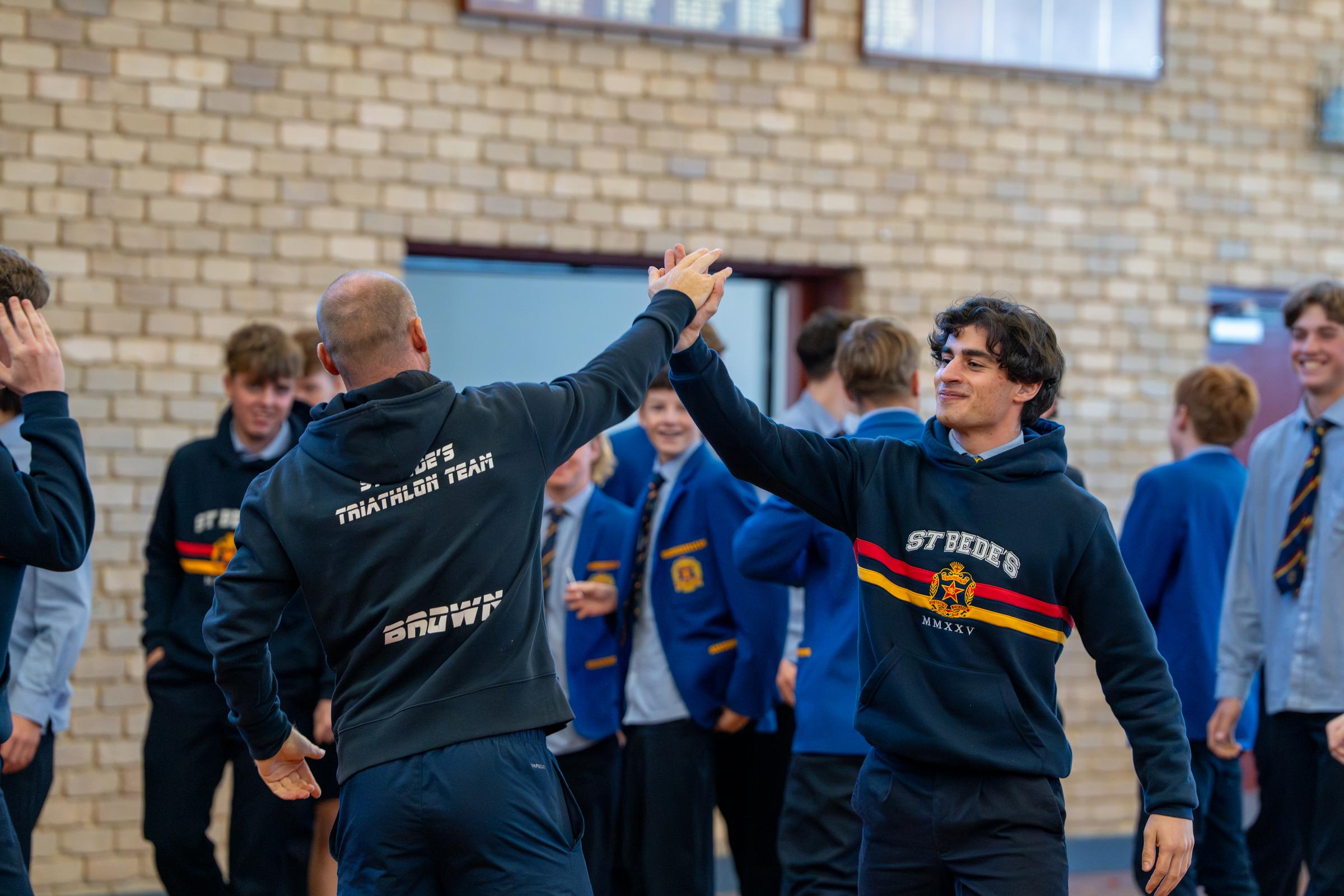Student Wellbeing

Championing Student Voice
Making Our College A Play For All To Thrive
We believe that every student has the power to shape our College Community in meaningful ways. At St Bede's College, the Student Representative Council (SRC) provides a structured platform for student voice—where ideas, concerns, and aspirations from students across all year levels are heard and acted upon.
With student representatives from Years 7 to 12, the SRC works in collaboration with staff to identify areas for improvement, suggest initiatives, and lead projects that enhance student wellbeing, College culture, and the learning environment. From sustainability efforts to College events, student-led advocacy to promoting respect and inclusion—the SRC plays a key role in making our College a place where everyone can thrive.
Importantly, the SRC empowers students to develop leadership skills, take responsibility, and represent the views of their peers. It reminds us that no matter what year level students are in, their voice matters—and when we work together, we can create a better future for our College and wider community.
We’re proud of the passion, dedication, and creativity our SRC members bring to their roles. Their contributions reflect what it means to be active, engaged, and caring members of the St Bede’s community.
This year's SRC comprises:
Year 7 - Henry B, Jacob D, Ivan P
Year 8 - Jonah C, Alexander N, Darcy T
Year 9 - Ashton B, Will C, Logan L
Year 10 - Jed R
Year 11 - Harry D, Nicholas S, Blake M, Charlie Bl, Charlie By, Oscar D, Connor K, Alessio D, Shaun J
Year 12 - Hamish D, George S
Staff - Scott Cadby, Chris Mills, Fleur White-Reid
Henry B (Year 7) shares his highlights as a representative in the SRC.
"Hi, I’m Henry, and I’m proud to be one of the few Year 7 students on the Student Representative Council (SRC) here at St Bede’s. Even though I’m new to the College, I want to show that students of any year level can make a meaningful difference and help improve our school community.
The SRC is open to students from Years 7 to 12, and together we work alongside Mr Scott Cadby, Mr Chris Mills, and other staff to make St Bede’s a better, safer, and cleaner place for everyone. As a Year 7 student, I’ve had the opportunity—along with my fellow Year 7 SRC member, Jacob—to collaborate with students right up to Year 12. It’s been a great experience learning from older students and sharing our ideas.
Being part of the SRC is all about contributing to the College and helping turn good ideas into real improvements. We meet once or twice each term to share suggestions, raise concerns, and discuss ways we can support positive change. Whether it’s about improving facilities, promoting respect, or encouraging environmental responsibility, our goal is always to make the College better for everyone.
The most important thing I’ve learned is that you don’t need to be an SRC member to make a difference. Every student at St Bede’s can contribute by taking responsibility—whether that’s by putting rubbish in the bin, being respectful in the yard, or looking out for others in and out of the classroom. When we all work together, we create a stronger and more supportive school community.
So, I’m not just asking you to support the SRC—I’m inviting you to help build a better St Bede’s for all of us. Every positive action counts."
The Vital Role Of Parents And Staff in Supporting Student Wellbeing
Beyond Men's Mental Health Week, as families, teachers and staff, we are reminded of the vital role we play in supporting the wellbeing of the boys in our care. Mental health is a critical part of overall development, and for young men, it can be especially complex. They are navigating a period of rapid physical, emotional, and social change, all while trying to find their place in the world.
As parents, and as staff in an all-boys setting, we are in a unique position to offer not only guidance and knowledge, but also understanding and emotional support. Every interaction whether in the classroom, on the sports field, at home, or in passing conversation, has the potential to shape how a young person feels about themselves and their place in the community.
Many young men struggle to express their emotions or seek help when they need it. The pressures of school, friendships, family expectations, and societal ideas about masculinity can sometimes make it difficult for them to speak up. Creating a culture where they feel seen, heard, and supported is one of the most meaningful things we can do.
Here are a few ways we can all help:
Be Present and Attentive
Try and find time to check in with your son / student, not just when there’s a problem, but regularly and informally. Showing genuine interest in their day-to-day experiences can help build trust and a sense of safety. Active listening without rushing to solve or judge can also encourage young men to open up in their own time.
Normalise Help-Seeking
Talk openly about mental health in ways that are age-appropriate and respectful. Share examples of how asking for help is a normal and responsible thing to do, even for adults. If students see you or other adults engaging in supportive conversations, it reinforces the message that it’s okay to talk.
Notice the Small Things
Behavioural changes can be subtle: reduced participation, irritability, lateness, or withdrawal from usual activities. These shifts may signal that a student is struggling. A quiet, private check-in can help them feel noticed and cared for, even if they’re not ready to talk in depth.
Encourage Healthy Expression
Our boys may need support in finding safe ways to express what they’re feeling. Encourage them to use tools that suit their personality like journaling, drawing, physical activity, or conversation. In your own interactions, model healthy emotional expression by speaking calmly, naming feelings, and managing stress visibly and constructively.
Lead with Empathy and Consistency
Our boys often look to adults for cues on how to handle difficult moments. Showing patience, offering positive reinforcement, and responding calmly helps set a tone of respect and reassurance. Being consistent in our expectations and responses gives our students the stability they need to feel secure.
We all play a part in creating an environment where our boys feel safe, valued, and empowered to grow, not just academically, but emotionally and socially. By continuing our work together, we can help break down harmful stereotypes, reduce stigma, and show our students that they don’t have to navigate challenges alone.
Thank you for everything you do to support the wellbeing of our students. Your dedication and care have a lasting impact.
Scott Cadby, PACFA Reg. Clinical (21605)
Psychotherapist
BA (Psych) MPsychotherapyCouns
College Counsellor and Wellbeing Coordinator
The Benefits Of Counselling
What College Counselling Offers
Our service is a confidential, professional and inclusive resource for all students from Years 7 to 12, across both campuses. College Counselling is tailored to each specific student and can be offered one-on-one or in a group context. Support can also last from a ‘one-off’ session to weekly/ongoing appointments.It is designed to provide support for a range of issues, including but not limited to:
- Managing stress and academic pressures
- Building self-esteem and resilience
- Navigating friendships and social dynamics
- Coping with family changes or personal challenges
- Addressing feelings of anxiety or sadness, and many more
How Students Can Access Counselling
- Self-referring to the Wellbeing Coordinator counselling@stbedes.catholic.edu.au
- Drop-in to our Wellbeing Office at our Mentone Campus (near the Chapel gardens)
- Requesting a referral from their Homeroom/Tutor Group teacher, Year Level/House Coordinator on their behalf
- Requesting a referral from their Parent/Guardian on their behalf (either via counselling@stbedes.catholic.edu.au or 9582 5999)
How Families Can Support
As parents and guardians, your role in your child’s wellbeing is invaluable. Some ways you can assist your child include:
- Helping them establish a balanced routine that includes time for study, relaxation, and hobbies
- Encouraging healthy sleep habits and a nutritious diet to support their overall wellbeing
- Being attentive to changes in their behaviour or mood, and gently ask how they are feeling if and when you notice any changes
- Promoting positive self-talk and help them set realistic goals for themselves
- Modelling healthy coping strategies, such as managing stress or problem-solving constructively
- Celebrating their achievements, no matter how small, to boost their confidence
- Encouraging open conversations about their feelings and experiences – but accept and understand if and when they may not want to open up to you (if this is the case encourage them to seek help elsewhere)
- Encouraging and reassuring them that seeking support is a sign of strength, not weakness
- Staying informed about the services and resources the school offers
Student Wellbeing Online Parent Sessions
The Parent and Carer sessions for The Common Ground are available for you to view online at your convenience via the links below
The Common Ground: Future Fit Masculinities - Years 10 to 12
The Common Ground: Future Fit Masculinities- Years 7 to 9
We appreciate every family collaboration and commitment with our College to support our students to do their personal best.
